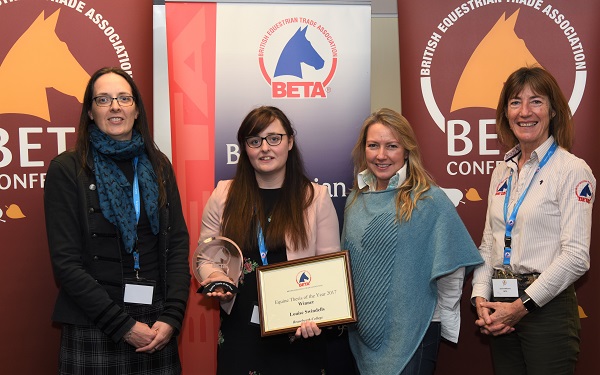Posted: 2nd November 2017 | Back to news feed

Louise claims BETA Equine Thesis of the Year title
Reaseheath College student Louise Swindells has won the 2017 BETA Equine Thesis of the Year award for her dissertation An Investigation into the Efficacy of Steaming Hay for Horses.

Left to right: judging panel chair Dr Georgina Crossman, award winner Louise Swindells, BETA chair Nikki Newcombe and BETA executive director Claire Williams. Picture: Bob Hook.
She joined the competition's two other finalists, the University of Limerick’s Sandra Hurley and Warwickshire College’s Lee Ann Imboden, at the Woodland Grange Hotel, near Leamington Spa, Warwickshire, on Sunday 29 October to present her thesis to the judging panel and audience of academics, industry representatives, friends and family.
Louise's dissertation, which aimed to quantify the reduction of fungal and bacterial species through steaming hay, and identify the fungal species that remain in hay after steaming, was named the winner by judges Dr Georgina Crossman, Dr Catherine Dunnett, Liz Benwell and Karen Coumbe.
The winning student’s undergraduate work was divided into two studies. The first used serial dilutions to quantify the microbial content of steamed and unsteamed hay on sabouraud dextrose agar (SDA) and plate count agar (PCA) – growth mediums for cultivating bacteria and fungi. The second study consisted of aerating hay samples before steaming, 0 hours post-steaming and 2.5 later. Resulting suspended particles were cultured on SDA. Mycological analysis was then carried out on the results of both studies to identify the surviving fungal species.
Both studies saw reductions in microbial content of hay through steaming. The first study revealed that bacterial levels were reduced by 99.28%, while the second showed that fungal contamination of hay increased 2.5 hours after steaming. Additionally, both studies revealed Aspergillus Fumigatus in post-steam hay samples. Louise concluded these results suggested that further work is needed to evaluate the risk of feeding steamed hay to the respiratory health of the horse.
“I am absolutely thrilled and a little shocked to have won,” said Louise. “The award is a great way for student work to be recognised and I have really enjoyed taking part. I knew that there had been studies showing a reduction in microbial contamination after hay had been steamed, but there did seem to be a gap when it came to looking at the bacterial and fungal species that survive the steaming process. I know that my study is just the start, but I do think that this is an area that should be looked into further.”
Dr Georgina Crossman, chair of the judging panel, praised each of the finalists on the high standard of their work. “It took a great deal of consideration and plenty of discussion before we made our final selection, which reveals how difficult our task was,” she said. “However, in the end, we decided that the award must go to Louise because she did a great job of taking this fascinating subject and presenting it in such a clear and easy-to-understand way.”
Claire Williams, executive director of the British Equestrian Trade Association, added: “We were tremendously impressed with all the students and really enjoyed listening to each presentation. Louise did incredibly well and we send her our congratulations and very best wishes for the future. She tells us that she is now working as a science teacher and we are sure that she will do extremely well in her chosen career.
“The BETA Equine Thesis of the Year award is a wonderful opportunity to celebrate undergraduate study and we would like to thank the colleges and universities that have taken part – and the preliminary and final judges whose expertise, knowledge and enthusiasm made it all possible.”
The Equestrian Index newsfeed is compiled from articles submitted by advertising members and expresses the opinions of those members. Watsons Directories Ltd shall not be held liable for any inaccuracies or mis-statements therein.